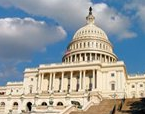 NEWS
NEWS
 NEWS
NEWS
 NEWS
NEWS
![]() As the debt ceiling fiasco clearly illustrated, Democrats and Republicans in Washington can’t agree on much of anything these days. But one area where there is consensus is on the need to improve government efficiency. That means opportunity for both cloud service providers and big data.
As the debt ceiling fiasco clearly illustrated, Democrats and Republicans in Washington can’t agree on much of anything these days. But one area where there is consensus is on the need to improve government efficiency. That means opportunity for both cloud service providers and big data.
As a percentage of the federal budget, IT spending is a rather paltry 2%. Still, that’s close to $85 billion. The new federal CIO, Steven VanRoekel, is intent on making better use of those funds in part by taking advantage of the economies of scale offered by cloud computing.
According to the Washington Post:
“The productivity gap between where the private sector has gone over the last two decades and where government has gone is ever-widening,” VanRoekel, 41, told reporters Thursday morning, referring specifically to the government’s slow uptake and lack of spending on new technology. “[This] can be done in a way that actually saves money, saves resources and everything else.”
In order to deliver on his pledge, VanRoekel plans to continue the government’s “Cloud First” policy as outlined by former federal CIO Vivek Kundra in February. The policy requires federal “agencies to evaluate safe, secure cloud computing options before making any new [IT] investments,” according to a report issued by Kundra’s office.
Services Angle
By its own admission:
The Federal Government’s current Information Technology (IT) environment is characterized by low asset utilization, a fragmented demand for resources, duplicative systems, environments which are difficult to manage, and long procurement lead times
This means the government will look to cloud service providers like Amazon and Verizon as it seeks to modernize its IT infrastructure; Software-as-a-Service vendors like Salesforce.com to improve accessibility for federal workers; and potentially Data-as-a-Service vendors like Kognitio in place of deploying expensive on-premise databases like Oracle.
Big data approaches like Hadoop should also be on the table, particularly for defense and intelligence agencies tasked with sifting through and making sense of huge volumes of data to catch terrorists and other criminals. Vendors like Cloudera and Think Big Analytics could play a critical role here not just in providing the technology necessary to leverage Big Data but also the services necessary to fine-tune Hadoop deployments.
Before government use of cloud computing and Big Data can really take hold, however, cloud service providers and other vendors must address security concerns. According to a report by the Ponemon Institute (as reported by eWeek), that’s going to require a change in mindset on the part of vendors:
A shocking 73 percent of U.S. service providers and 75 percent of their European counterparts said their cloud services did not substantially protect and secure their customers’ confidential or sensitive information, according to the recent Security of Cloud Computing Providers report from the Ponemon Institute. Nearly 62 percent of U.S. providers and 63 percent of European providers were not confident that their cloud applications and resources were secure.
Approximately 69 percent of cloud providers in the survey didn’t believe securing the data was their responsibility. Just 16 percent of cloud providers felt security should be a shared responsibility. Vendors told the Ponemon Institute researchers they didn’t always evaluate their systems and applications prior to deploying them to the customer.
For the sake of taxpayers footing the IT bill, let’s hope the government and vendors can find a way to make secure cloud computing and big data a reality.
THANK YOU